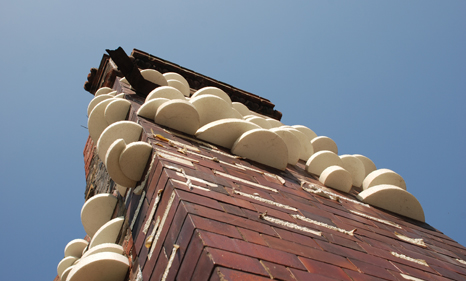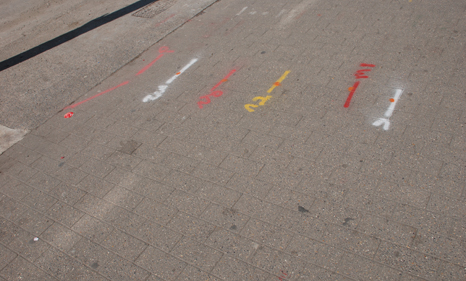hide and seek, a life
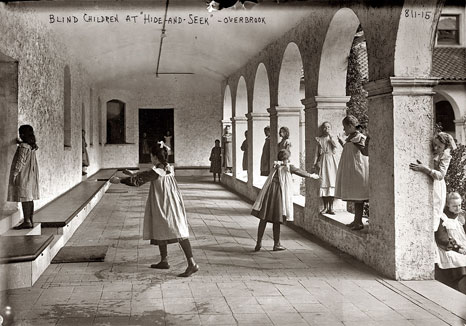
blind children playing hide and seek, 1912 (via julian kücklich)
“i remember that the verb to find [trouver] does not first of all mean ‘to find,’ in the sense of a practical or scientific result. to find is to turn, to take a turn about, to go around. to come up with a song is to turn a melodic movement, to make it turn. no idea here of a goal, still less of a stopping. to find is almost exactly the same word as to ‘seek’ [chercher], which means to ‘take a turn around.'” (maurice blanchot, the infinite conversation)
Posted by f | reply »kind of, sometimes

to the old lady working at the internet cafe, whom i could slam a hundred times in aftermath but only saw my childish smile in backwards retreat, we could make an example of you in our courteous, civilised new metropolis, as per a certain someone said i was often wont to do, some sort of ethnographic approach to what lack of humanity there may be in world of screens and headphones, of blank faces and pounding hearts, why in the world should i wish to make an example of you, sickly woman with cracked face who sits in the dark by day, your rule this world perhaps and i am mere observer, a hasty brushing off sends me away, without being able to engage in the very services that you offer. or the mistake that we make in this situation is that working for the money (the system that creates low wage working conditions, the worker that desires to fill this position for lack of better opportunity, because it is easy, because it is simply what is there) eliminates the very ‘you’ of this equation, for You, Other, are simply no longer there. This is not an issue of being looked down upon or prejudiced, it is the disappearance of another all together. Combined with the last 61 years of our lack of self, we come back in full force with an overbearing subjectivity that oppresses all not-self as well. it leads us to a form of exchange without humanity whatsoever, but what sort of presumption was that, anyway.
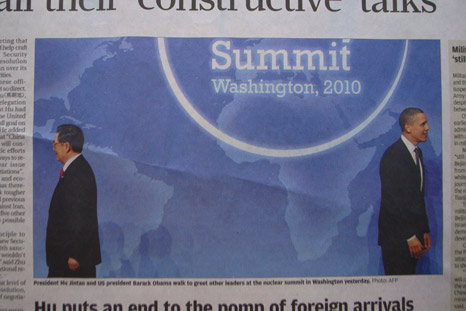
i cringed when he mentioned that words had been missing of late, but the lack of literature could have been a parallel to a similar decline of the sense of being. i am present, perhaps, in some way, a childish half-smile, but it’s only half-shock, a blinding before anger sets in, what was that about to solidify, hard-set equations, exchange is never all that, i kind of hate you sometimes, kind of, sometimes.
Posted by 丫 | reply »we start talking to no one in particular, a no one without properties
“what a lovely name for a street.” feeling. still. yes. no. nostalgia. for something that will never be. alas. so we walk. we walk. with the need for dreams to commit suicide. sometimes. “c’est la chose la plus horrible à faire“. or is it. again and again. and an afternoon in the sun. tracing and retracing and walking anew. circles perhaps. fly. yes. fly again. it’s good to be in a place without lists and rows. construct to reconstruct or an economics as a doing. in the city. it would be nice to see what we cannot see. “precisely to fill the emptiness with emptiness, and thus to share it.” you do with it what you will. never a prescription for life. and yes we are left ‘inconcluded’. always. upon arriving home a message overheard from the new york subway through to london: “everyone knows. that love. belongs in the microwave. for two minutes.” 哈! thank you maria.
Posted by a | reply »samples, what to say
he had definitely found it….
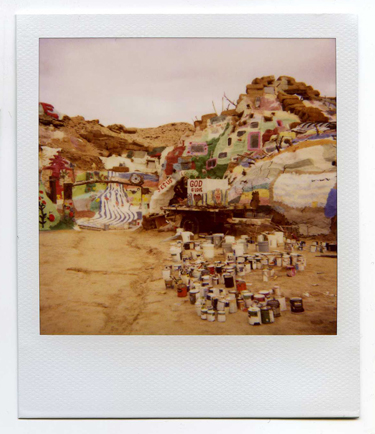
…see more here
Posted by joe | reply »wasted time, excessive time, suspended time, comrades
“But when we begin to question our projects, to doubt or reformulate them, the present, the contemporary, becomes important, even central for us. This is because the contemporary is actually constituted by doubt, hesitation, uncertainty, indecision—by the need for prolonged reflection, for a delay. We want to postpone our decisions and actions in order to have more time for analysis, reflection, and consideration. And that is precisely what the contemporary is—a prolonged, even potentially infinite period of delay. Søren Kierkegaard famously asked what it would mean to be a contemporary of Christ, to which his answer was: It would mean to hesitate in accepting Christ as Savior. The acceptance of Christianity necessarily leaves Christ in the past. In fact, Descartes already defined the present as a time of doubt—of doubt that is expected to eventually open a future full of clear and distinct, evident thoughts.”
–boris groys, comrades of time
Posted by f | reply »ideas about karaoke
recorded at Lee Kit’s “Someone singing and calling your name”, december 2009
Posted by 丫 | reply »